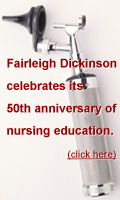


|
 The Henry P. Becton School of Nursing and Allied Health is helping to attract young people to the field of nursing and enabling professionals to advance in the workforce. Director Minerva Guttman says, “There is a great shortage of nurses, particularly those who are educated at the baccalaureate level.”
The Henry P. Becton School of Nursing and Allied Health is helping to attract young people to the field of nursing and enabling professionals to advance in the workforce. Director Minerva Guttman says, “There is a great shortage of nurses, particularly those who are educated at the baccalaureate level.”
“Baccalaureate-educated nurses are the ones who will become case managers — managing the needs of a group of patients on, say, a hospital floor,” says Guttman. “Here we need both men and women with leadership skills, problem solving skills and critical thinking skills.” Other graduate nursing programs broaden the possibilities for nurses. The master of science in nursing prepares nurses for roles as nurse practitioners specializing in administration or education; post-master’s and post-doctoral programs prepare them for certification as adult nurse practitioners; and a post-master’s certificate in education provides knowledge in teaching theory, curriculum development and evaluation. Accelerated programs for students who have baccalaureate degrees in other fields can be completed in one to two years on full- or part-time bases. Nurses interested in administration also may take a master of public administration with concentrations in either nursing management or health services administration at the University’s Public Administration Institute. Guttman says it is important to target young people, even at the elementary school level. She insists that “we need to let students know what nurses really do — what opportunities are open to them.” In addition to management positions, nurses are a valuable resource for patient education and advanced practice nurses even have the ability to prescribe medication. With a $10,000 grant from Johnson & Johnson, the School of Nursing and Allied Health is establishing a prenursing academy to generate interest among high-school students by bringing 10th graders into the classes and nursing labs. “Nursing needs to be known as a career for both women and men where you can advance — where you have a choice,” says Guttman. “Nurses are no longer bound to routine duties in the hospital. They go on to become managers for HMOs, or continue their education to become faculty members and researchers upon completion of a doctoral degree. There is even the opportunity to receive grants for research.” For more information contact Susan Warren, associate director of graduate nursing programs, 201-692-2888, or Christine Mihal, associate director of undergraduate nursing programs, 201-692-2880. |
|
EMERGENCY: Is Health Care on Life Support? FDU Magazine Directory | Table of Contents | FDU Home Page | Alumni Home Page | Comments |
|